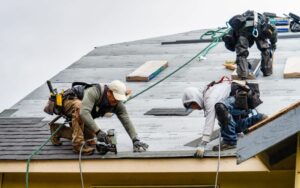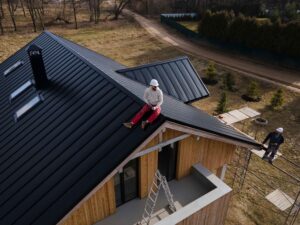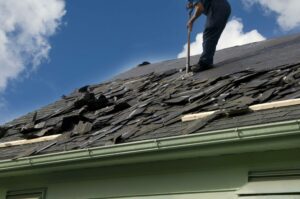Calculating roofing costs involves several critical factors that can greatly impact your budget. You’ll need to measure your roof’s size and pitch first, as these elements dictate material requirements and labor needs. Selecting the right roofing material is also essential, considering both upfront costs and long-term durability. But that’s just the beginning; various additional costs can arise. Understanding these components will help you avoid unexpected expenses down the line.
Key Factors Affecting Roofing Costs
When considering roofing costs, it’s essential to understand the key factors that influence pricing. The size of your roof plays a significant role; larger roofs require more time and effort for inspection, which can increase costs. The type of roofing material also affects complexity—different materials may demand specialized inspection techniques. Additionally, roof pitch impacts both inspection difficulty and safety protocols, especially for steeper roofs. Accessibility is another factor; roofs that are hard to reach might incur extra setup costs. Finally, the overall complexity of the roof, including its features and condition, necessitates varying levels of expertise, further influencing the final cost. Understanding these elements helps you anticipate expenses effectively.
Cost of Roofing Labor and Installation
Understanding the costs associated with roofing labor and installation is essential for budgeting your project effectively. Labor typically ranges from $50 to $150 per hour, depending on the complexity of the job and the contractor’s experience. Installation costs can vary considerably based on the roofing material chosen, with asphalt shingles generally being more affordable than metal or tile. The size and pitch of your roof also impact labor time and costs; steeper roofs may require additional safety measures, increasing overall expenses. Additionally, contractor fees for permits and inspections can add to your total. By evaluating these factors, you can plan your roofing project budget more accurately and avoid unexpected expenses during installation.
Additional Costs to Consider
While planning your roofing project, it’s vital to factor in additional costs that can arise beyond the basic labor and material expenses. For instance, roof inspections typically range from $120 to $600, depending on your roof’s size, type, and pitch. A basic visual inspection might cost $120 to $250, while advanced options such as infrared or drone inspections can escalate costs to $400 or more. Furthermore, accessibility challenges or complex roof structures may incur extra fees. Don’t forget to reflect on potential repair costs identified during inspection, as well as follow-up services to guarantee proper maintenance. Each of these factors plays an important role in your overall roofing budget, so be thorough in your planning.
How to Get an Accurate Roofing Estimate
To get an accurate roofing estimate, you must consider various factors that influence the overall cost and scope of the project. Start by evaluating the size and type of your roof, as larger and more complex roofs typically require more time and resources for inspection. The pitch of your roof also plays a role; steeper roofs may necessitate additional safety measures, impacting costs. Accessibility is essential too—hard-to-reach areas often incur extra fees. Choose the right inspection type based on your needs, from basic visual evaluations to advanced infrared or drone inspections. Before finalizing your roofing budget, it’s important to understand how long a roof should last to ensure you’re making a cost-effective, long-term investment. Finally, make sure the estimate includes a detailed report, clear recommendations, and potential follow-up services to address any findings effectively.
Understanding Roofing Cost Breakdown
After obtaining an accurate roofing estimate, it’s important to break down the costs associated with the project. Begin with the inspection type; basic visual inspections typically range from $120 to $250, while advanced infrared inspections can cost between $400 to $600. Roof size and type greatly influence the overall cost, as larger and more complex roofs require more time and expertise. Roof pitch also affects inspection difficulty, potentially increasing costs for steeper structures. Accessibility plays a vital role; hard-to-reach roofs might incur additional charges. Finally, detailed reports following inspections outline necessary repairs, complete with recommendations and cost estimates, ensuring you understand the financial implications before proceeding with any work.
Tips for Saving on Roofing Costs
When planning a roofing project, understanding how to save on costs can greatly impact your budget. Start by researching various materials; opting for 3-tab shingles can markedly reduce expenses while still providing adequate protection. Measure your roof accurately to avoid overestimating square footage, and consider the slope’s impact on labor costs. Timing your project for spring can also yield savings, as contractors may offer promotions during this season. Avoid common pitfalls by thoroughly vetting contractors—look for proper licensing and insurance, and request written estimates. Finally, don’t overlook regular maintenance; addressing small leaks promptly can prevent costly repairs down the line, ensuring your roof remains in good condition for years.
Frequently Asked Questions
What Roofing Materials Last the Longest and Why?
When considering longevity, metal roofing, slate, and tile materials stand out. They resist weather damage, require minimal maintenance, and provide excellent insulation, ensuring durability and energy efficiency for your home over the years.
How Do Weather Conditions Affect Roofing Costs?
Weather conditions greatly impact roofing costs. When selecting materials, consider durability against local climate factors like temperature fluctuations, precipitation, and wind. Adverse weather may necessitate additional labor and materials, ultimately influencing your overall budget.
Are There Financing Options Available for Roofing Projects?
Yes, you’ve got financing options for roofing projects. Many contractors offer flexible payment plans, and some even partner with lenders for low-interest loans. It’s essential to explore these to manage costs effectively without compromising quality.
How Can I Prepare My Home for Roofing Installation?
To prepare your home for roofing installation, clear the area around your home, secure any outdoor furniture, and guarantee access for contractors. Inform your neighbors about the project to minimize disruptions during installation.
What Permits Are Needed for Roofing Work?
You’ll need to check local regulations for roofing permits, typically including building permits and possibly zoning permits. It’s essential to consult with your contractor to guarantee all necessary permits are obtained before starting work.




